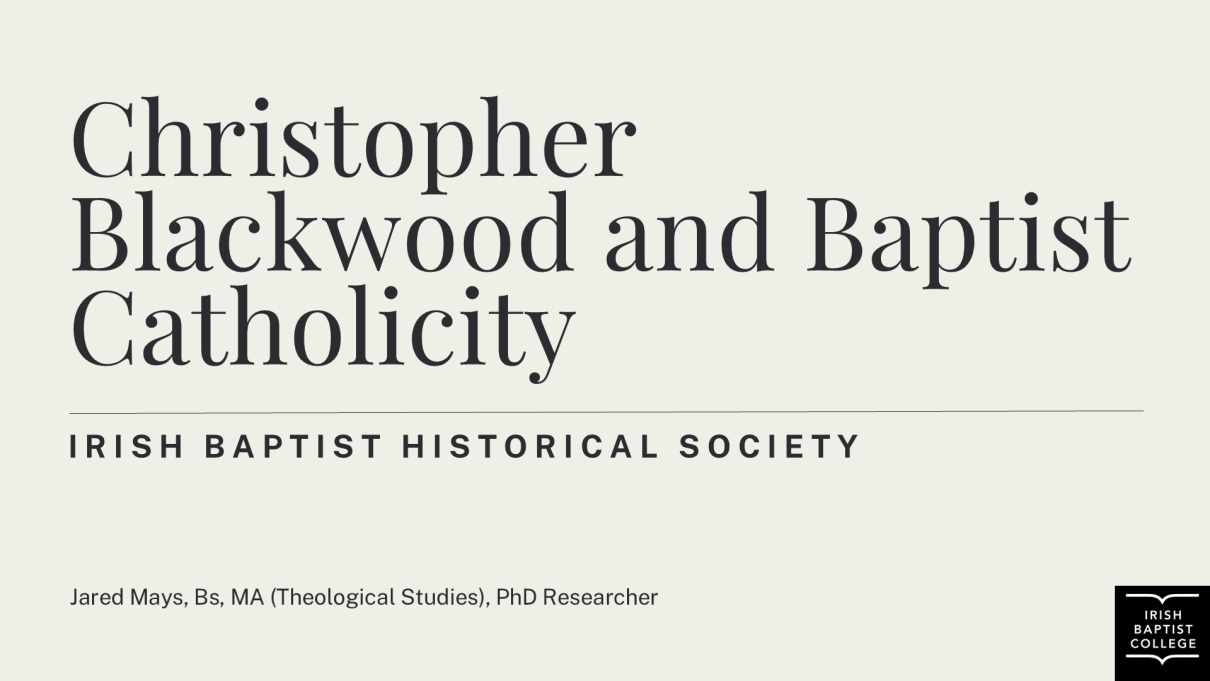Irish Baptist Historical Society Report: Christopher Blackwood and Baptist Catholicity

By Samuel Thomson
The Irish Baptist Historical Society held another lecture on 13th March, presented by Jared Mays (pastoral intern at Great Victoria Street Baptist). Speaking on the life of Christopher Blackwood and the topic of Baptist catholicity, Jared opened with the premise that despite modern assumptions, anti-intellectualism is not the legacy of Irish Baptists. Blackwood serves as an example of a widely read, highly educated theologian who used the Christian tradition in all its breadth, both desiring and pursuing Christian unity.
Jared discussed Blackwood’s academic influences from Cambridge and his broad theological background, which spanned the Church of Ireland, General Baptists, and later, the Particular Baptists. He then explored Blackwood’s writings, including A Soul-Searching Catechism, The Storming of Antichrist, and his sizeable commentary on Matthew’s Gospel. These works cite a range of patristic, medieval, Reformed, and Puritan sources, demonstrating Blackwood’s willingness to engage both critically and positively with various traditions. He cared little for the ecclesiological background of his sources, focussing instead on how scriptural their arguments were. While he could have argued from Scripture alone, he opted instead to cite from those who held an orthodox position on each issue, reminding us of the importance of standing on the shoulders of those who have gone before us.
There is a real need for us, as modern Irish Baptists, to connect with our history: the traditions of patristic, medieval and reformation theologians provide us with a rich legacy of orthodoxy to draw from. The depth and breadth of Blackwood’s reading challenges our often narrow approach. When Scripture is our supreme standard, as it was for Blackwood, we have the freedom to read widely, agreeing with all that aligns with scripture. I personally appreciated this challenge to read more, including those from traditions outside my own.
Another lesson from Blackwood, which was of particular interest to me, arose out of this aforementioned ‘catholicity’. For Blackwood, doctrinal distinctives did not necessitate a lack of unity across lines of disagreement. As Jared articulated it: Doctrine does divide, but it does not need to be divisive. This is increasingly relevant in our current theological climate: the true church must be united in her pursuit of biblical belief and practice. Blackwood’s example of catholicity helps us to navigate denominational issues - doctrinal unity can be simultaneously upheld with doctrinal distinctiveness. Being a particular Baptist in the 17th Century was particularly complex, and yet Blackwood was able to navigate denominational differences while maintaining unity through a common faith in the gospel. His example demonstrates that it is easier to find common theological ground when we don’t shy away from what is different. Downplaying theological issues for the sake of maintaining church unity can often end up being counterproductive.
While Baptists have sometimes been styled as a pragmatic, anti-theological group, our history on this island tells a different story – one of rich theological heritage. This should not only inform our theology, but also lead us to seek unity with the wider (biblical) Christian tradition.
The next IBHS Lecture is Tuesday 13th May at Ballynahinch Baptist Church.





